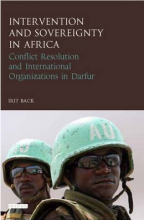
In Intervention and Sovereignty in Africa, Irit Back examines the changes in African discourse on interventions in intrastate conflicts. She uses the African Union’s intervention in Darfur to show the dynamics of African approaches to peacekeeping and conflict resolution. By using Darfur as a case study, she traces the evolution of African principles on intervention and state sovereignty. Within this subject, Back focuses on the actions and roles of institutions like the African Union, the government of Sudan, the United Nations-African Union Mission, among others. All in all, she certainly succeeds in her effort to write the first comprehensive, analytical book about the African Union mission’s role in Darfur.
This book provides insight into how African states developed from conforming to a policy of nonintervention to the wide acceptance of the principle of Responsibility to Protect (R2P). Back argues that the African Union’s intervention in Darfur marked this shift in regional policy. The Darfur conflict had all three markers for justifying foreign intervention, which Back clearly explains. She also details the mediation process and explains how specific political events like the African Union’s refusal to grant the government of Sudan impacted member nation relations and the diplomatic process.
This book is highly readable for both political science scholars and the more casual reader, for which Back deserves accolades. The Darfur conflict is complex, but Back succeeds in deconstructing it in a methodical, clear, and informative manner. Early on, she gives a comprehensive background of the conflict in Darfur before she proceeds to explain the progression of regional and international responses. This serves as an introduction to the subsequent developments in the conflict as well as to ensure that each reader understands the necessary background information. Back begins the book by explaining the principle of nonintervention in intrastate conflicts that became popular in Africa after the 1963 creation of the Organization of African Unity and ends it with how recent uprisings in Arab states have affected African discourse on state sovereignty and foreign intervention. She draws connections with African attitudes toward foreign interventions in intrastate conflicts in Arab Spring revolutions with attitudes toward foreign intervention in Darfur, arguing that interventions in Arab Spring reflect the continuing development of international and global positions on respecting state sovereignty and intervention in intrastate conflicts.
Back analyzes both international and regional impressions of the conflict in its early stages, as well as how information was gradually disseminated. The international community knew little about Darfur before the conflict broke out, which was reflected in the characterization of the violence as simply a struggle between Arabs and Africans. This book is significant because it is, as Back intended, the first comprehensive analysis of the African Union’s mission’s role in Darfur as well as an exploration of the principles of nonintervention and state sovereignty in Africa. Given the various violent conflicts currently occurring throughout the continent, including in Darfur, it is crucial for military strategists, policy makers, and international organizations to understand the regional history and dynamics in order to act strategically and effectively. Irit Back’s book is a necessary read for anyone who wishes to seriously understand African positions on respecting state sovereignty versus the obligation to intervene in intrastate conflicts.







